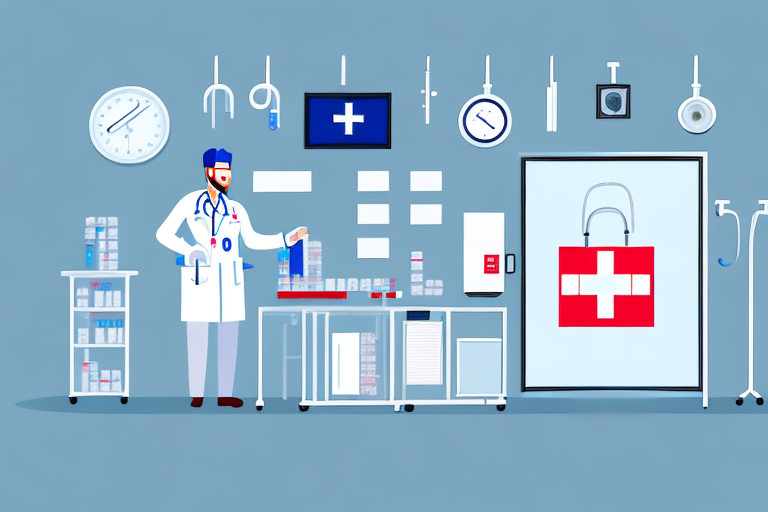Exploring the Benefits of a Medical Courier Job
Are you interested in working in the healthcare industry but don’t want to take the traditional route of nursing or becoming a doctor? You might want to consider a career as a medical courier. Curious about what a medical courier is and the benefits that come with the job? Read on to discover everything you need to know about this exciting and rewarding career path.
What is a Medical Courier?
Definition and Role
A medical courier is a specialized delivery professional responsible for transporting healthcare-related items such as blood, tissue, organs for transplant, and medical equipment. These couriers ensure that these critical items are delivered promptly and securely to hospitals, clinics, laboratories, and other healthcare facilities.
Key Responsibilities
- Transporting medical specimens and supplies while maintaining their integrity.
- Adhering to strict protocols for the safe handling of sensitive materials.
- Navigating efficiently through traffic to meet time-sensitive delivery schedules.
- Managing pick-ups and drop-offs of medical waste and equipment.
- Maintaining and sanitizing company vehicles to ensure safety and compliance.
Benefits of Working as a Medical Courier
Competitive Compensation
Medical courier jobs often offer competitive salaries. According to the Bureau of Labor Statistics, the median annual wage for couriers and messengers was $34,320 in May 2022, with specialized positions like medical couriers potentially earning more due to the critical nature of their work.
Flexible Scheduling
Many medical courier positions offer part-time and flexible schedules, making it easier to balance work with other commitments such as education or family.
Job Stability and Growth
The demand for medical couriers is expected to grow alongside the healthcare industry. As the population ages and healthcare services expand, the need for reliable transportation of medical materials will continue to rise.
Impactful Work
Medical couriers play a vital role in the healthcare system. They contribute directly to patient care by ensuring that essential medical supplies and specimens reach their destinations promptly, which can be life-saving in critical situations.
Daily Responsibilities of a Medical Courier
Transportation and Delivery
The primary duty of a medical courier is to transport medical items safely and efficiently. This includes navigating to various healthcare facilities, adhering to delivery schedules, and ensuring the timely arrival of sensitive materials.
Maintaining Safety Protocols
Couriers must follow strict safety guidelines, especially when handling hazardous materials. This includes wearing appropriate personal protective equipment (PPE) and using secure containers for transport.
Vehicle Maintenance
Maintaining the cleanliness and functionality of the delivery vehicle is essential. Regular checks ensure that the vehicle is in good working condition, which is crucial for meeting delivery deadlines.
Record Keeping and Compliance
Accurate documentation of deliveries and pickups is necessary to comply with healthcare regulations. Couriers must log their activities and report any issues that arise during transportation.
Qualifications and How to Get Hired
Basic Requirements
- Valid driver’s license with a clean driving record.
- High school diploma or GED.
- Reliable transportation and ability to maintain a vehicle.
Preferred Skills and Certifications
- Excellent time management and organizational skills.
- Attention to detail and commitment to safety.
- Ability to work independently and handle sensitive materials.
- Certifications in hazardous materials transportation can be advantageous.
Application and Training
Many companies offer on-the-job training for new hires, covering topics such as safety protocols, delivery procedures, and regulatory compliance. Demonstrating reliability and professionalism during the application process can increase your chances of getting hired.
The Importance of Confidentiality
Patient Privacy
Medical couriers handle sensitive and confidential medical information. Adhering to the Health Insurance Portability and Accountability Act (HIPAA) is crucial to protect patient privacy and avoid legal repercussions.
Secure Transportation Methods
Using locked containers, GPS tracking, and other security measures helps prevent theft or loss of confidential medical items during transportation.
The Future of the Medical Courier Industry
Technological Advancements
Advancements in technology, such as real-time tracking systems and automated routing software, are enhancing the efficiency and safety of medical courier services. Additionally, the potential use of drones for deliveries is being explored to reach remote or hard-to-access areas quickly.
Focus on Sustainability
There is an increasing emphasis on sustainability within the industry. Many companies are adopting eco-friendly practices, such as using electric or hybrid vehicles, to reduce their environmental impact.
Salary Expectations and Employment Opportunities
As of 2023, the average salary for a medical courier in the United States ranges from $35,000 to $50,000 annually, depending on factors such as experience, location, and employer. Specialized roles or positions requiring additional certifications may offer higher compensation.
Types of Employers
- Specialized medical courier companies.
- Hospitals and healthcare facilities.
- Pharmacies and laboratories.
- Biotechnology and pharmaceutical companies.
Tips for Excelling as a Medical Courier
Enhance Communication Skills
Effective communication with clients and healthcare professionals is essential for successful deliveries and building strong professional relationships.
Develop Strong Time Management
Managing deliveries efficiently to meet tight schedules is crucial. Prioritize tasks and plan routes to maximize productivity.
Prioritize Safety and Compliance
Always adhere to safety protocols and regulatory requirements to ensure the secure transport of medical materials.
Balancing Work and Life
Establish a Defined Schedule
Creating a clear separation between work hours and personal time can help maintain a healthy work-life balance, especially given the often irregular hours of courier jobs.
Take Regular Breaks
Ensure you take adequate breaks during your shifts to rest and recharge, preventing burnout and maintaining overall well-being.
Pursue Personal Interests
Engaging in hobbies and activities outside of work can provide a fulfilling and balanced lifestyle.
Conclusion
A career as a medical courier offers numerous benefits, including competitive pay, flexible scheduling, and the opportunity to make a meaningful impact in the healthcare industry. As the demand for reliable medical transportation continues to grow, the role of medical couriers becomes increasingly vital. With the right qualifications and a commitment to excellence, a medical courier job can be a fulfilling and rewarding career choice.






















